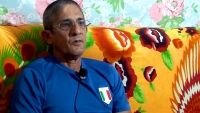Carlos Manuel Cabreras Calviño
* 1967
-
“As I am telling you, I have been detained four times for selling some goods on the street, what my sister brought, for example a tube, then a flip-flop or some shorts. Damn! Do you think that the human being can become rich like that? The Cuban does it to gain ten pesos, to sell what he has, the Cuban is trying to sell because he does not have any money to buy food. The Government does not think about it. They do not understand it. What they want is to catch the guy, the seller, to give him a fine, and raise money. I do not know what else it could be. Nobody can think that a man selling some trinkets on the street could become rich. People are just trying to find a way how to gain ten pesos in order to eat something. The seller on the street cannot pay a license, because one day he sells something, but then fifteen or twenty days pass and he does not sell anything because he has nothing to sell, so he cannot pay this state permission.”
-
“People are waiting to see what they bring, what they offer in the market. Imagine, people are starving. Here in Cuba, there always has existed hunger, it is our life, but this hunger becomes more acute. During the special period [economic crisis during the nineties when the Soviet Union felt apart and also the economic support to Cuba] that was abusive. Now, the Government must see what measure to take, what to do, because it is not possible. With seven pounds of rice you cannot eat. You cannot eat with seven pounds of rice, later they give you five, and then they tell you they will give you seven pounds again, but there is also no meat, there is no chicken, there is nothing. When they take out a chicken for sell, it is a problem to buy it, it is awfully expensive. People should go to the fields to cultivate something, it should be permitted, to have an alternative, because if not, your family is going to starve, compadre!”
-
“There [in the Combined Prison of Guantánamo] I declared several hunger strikes, because I did not agree that they threw me in the cell number 19, they transferred me to this cell number 19. There they undressed me by force, while I was telling them that I was on a hunger strike, however, they placed me there in the cell and said to me: ‘Nothing will be achieved this way, amigo.’ I was naked in that cell; they brought my mother. They brought my mommy who was sick too, they told my mother that, well my mom, you know, they talked to her and manipulated her, so when she saw me, she told me that she was not going to eat until I ate! If I did not eat, she would not eat either. I said, ‘Mom, they are going to imprison me here for a while, even if I did not do anything.’ ‘Oh, my son, we are going to fight, we are going to do this and that, we will do our best. If you do not eat, I am not going to eat either my son.’ It broke my soul, so I decided to eat.”
-
Celé nahrávky
-
Cuba, 13.05.2020
(audio)
délka: 01:32:53
Celé nahrávky jsou k dispozici pouze pro přihlášené uživatele.
“I am not afraid to fight the regime in Cuba, although it costs me my life. It is better to be dead than humiliated.”
Carlos Manuel Cabreras Calviño was born in 1967 in the town called Cecilia in the province of Guantánamo. When he was 23 years old, in 1985, he moved to the city of Cienfuegos because of his new work on constructing the Juraguá Nuclear Plant and later of the Oil Refinery. He returned to Guantánamo in 1989 to continue as a construction worker. In 2002 and 2006, he was accused of drug trafficking due to the perjury of another person and imprisoned in the “Combined Prison of Guantánamo” [Combinado de Guantánamo]. Because of his health problems, in 2008, he was transferred from the prison to another penitentiary institution with a program called “Confidence Plan” [Plan Confianza]. He remained there until 2009, when he suffered a brain infection and was hospitalized in Havana. This incident resulted in the loss of hearing, problems of equilibrium, and memory, which negatively affects Carlos‘s chances to find employment. He is married and has two children. He resides in Guantánamo and works reselling clothes and food, which is illegal in Cuba without state permission.
